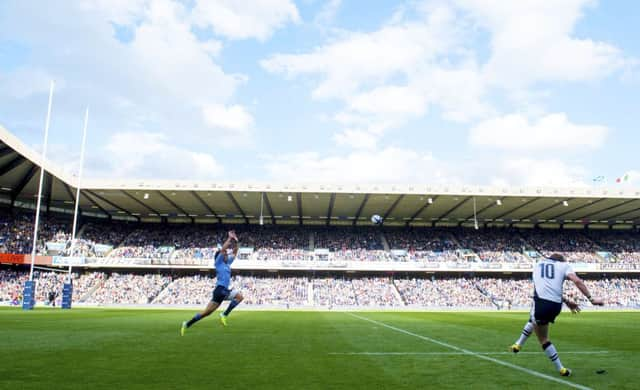Allan Massie: Let’s not downplay Scotland victory


Admittedly Italy are a lesser side without their captain Sergio Parisse, but this was an experienced Italian XV, and, but for Parisse, pretty close to their first choice one. So we shouldn’t downplay the Scottish performance. A victory by 41 points is satisfactory. We have often enough been pleased to beat Italy at all.
Vern Cotter isn’t of course a man to get carried away. If New Zealanders are, in rugby terms, Scots who have learned to win, then P G Wodehouse’s line about there being no difficulty in distinguishing between a Scotsman with a grievance and a ray of sunshine applies equally to our Kiwi coach. He was quick to remark that three of the Scottish tries came from interceptions, almost as if these tries should be discounted. Well, in a sense of course, these tries are not “created”. They do however testify to a welcome alertness and readiness to seize opportunities. Moreover an interception often becomes possible when an opponent is put under pressure and makes an injudicious pass.
Advertisement
Hide AdAdvertisement
Hide AdScoring six tries – of any kind – is good, and, considering how difficult Scotland have often found it to turn pressure into points, more than welcome. Careless or inaccurate passes, and a couple of wrong options taken, may well have cost us other tries. Yet it should be said that the same is true of most teams that play an expansive game. Even the All Blacks usually spurn a few chances, and don’t always make the right decisions. But they win matches because they give themselves more opportunities to score tries than almost anyone else, and take a high percentage of them.
Saturday’s team did well enough to have one thinking that one would be content to see the same XV start the big World Cup matches, though I daresay Richie Gray and Tommy Seymour, to name only two, might have a different opinion about that. The forwards of course built the platform for victory. Insofar as anyone off the pitch can make sense of what goes on in the set scrum these days, the front row of Alastair Dickinson, Ross Ford and Willem Nel, supported by a good push from Grant Gilchrist and Jonny Gary at lock, seemed to have the upper hand. That’s to say, they won more penalties than they conceded, and this, rather than delivering quick ball or making strikes against the head, seems to be the purpose of scrummaging today. The lineout was secure, and a voracious back-row of Ryan Wilson, David Denton and John Barclay helped to ensure that Greig Laidlaw got very much cleaner and quicker ball from the breakdown than he has often been accustomed to.
Finn Russell looked calm and assured. His delicate chip to put Sean Lamont in for the first try and the 20-yard pass off his right hand to allow Tim Visser to stroll over for his first one were beautifully executed. They also offered pleasing evidence of his ability to read the game and see where the space is. Dan Carter or Jonny Sexton couldn’t have done better.
All the outside backs contributed, and , in the likely absence of Alex Dunbar, the question of Mark Bennett’s partner probably remains open. Peter Horne’s ability to play as a second fly-half, and to kick with his left foot, may just get him the nod.
Beating Italy doesn’t, in the present state of Italian rugby, make you a great team, but enough was shown on Saturday to make optimism for the World Cup seem a great deal more reasonable than looked to be the case a few months ago. We no longer need to whistle to keep our spirits up.
Nevertheless this is still a fairly inexperienced squad. Most of those who started on Saturday will be playing in their first World Cup. Mark Bennett, Peter Horne, Finn Russell, Willem Nel, Jonny Gray, Grant Gilchrist and Ryan Wilson don’t have a hundred caps between them. Leave out any two or three of Lamont, Laidlaw, Dickinson, Ford, Denton and Barclay, and you would have difficulty in selecting a side with a sizeable body of experience.
And everybody agrees that experience is needed in World Cups. That is why Australia abandoned their policy of not selecting players from European clubs so that they could recall Matt Giteau and Drew Mitchell. Conversely it’s why some of England’s 2003 winning team, now turned pundits, are worried because two of the centres picked by Stuart Lancaster have a total of two caps.